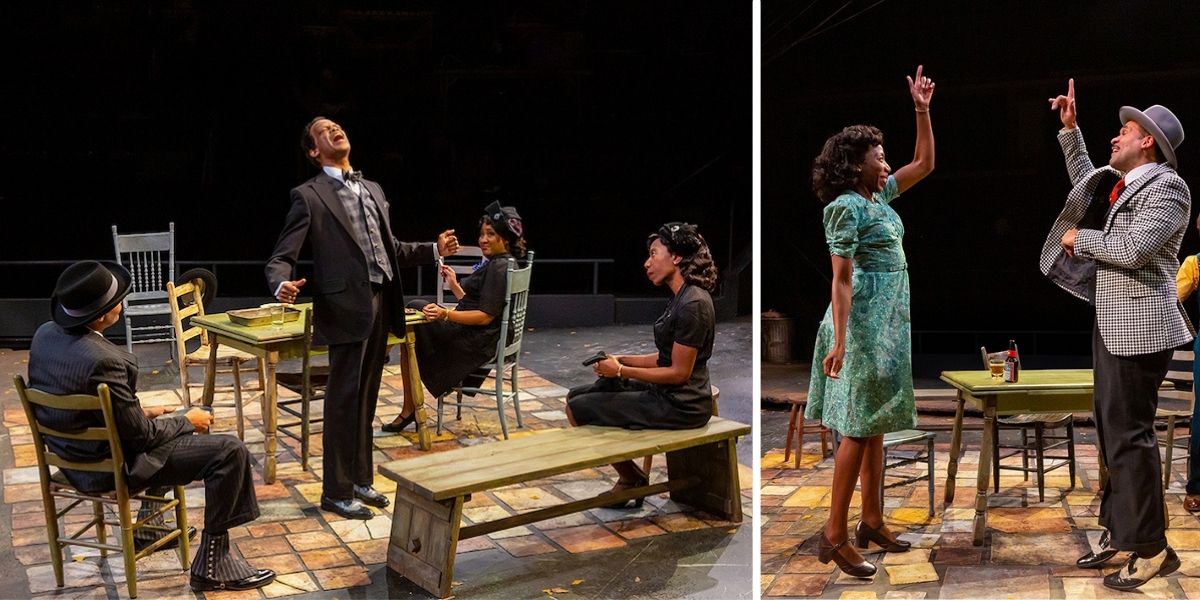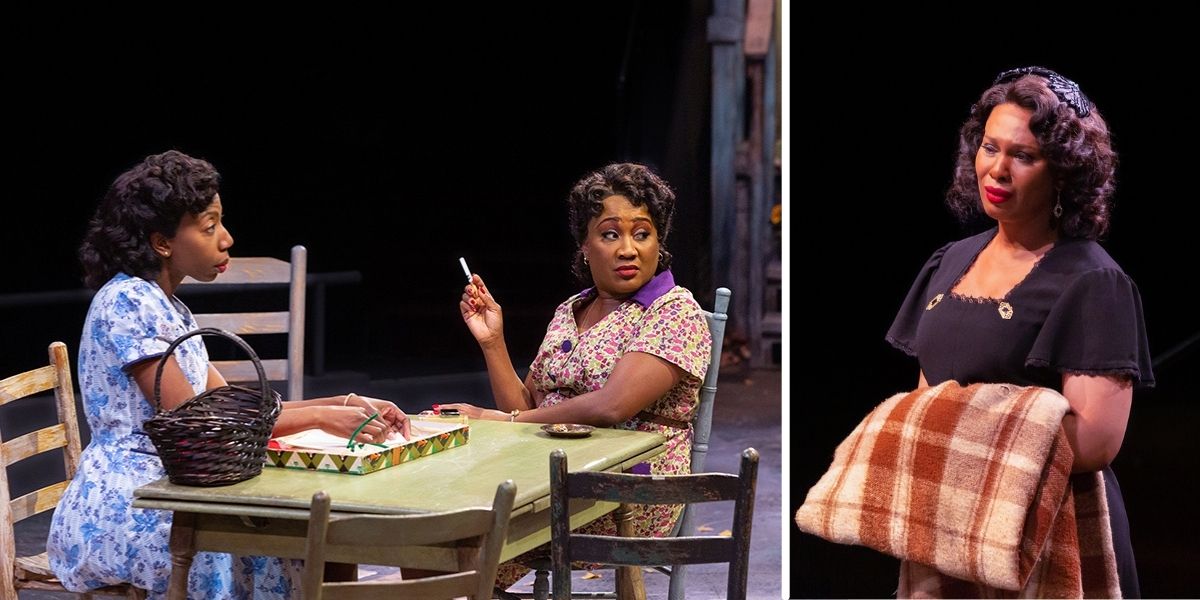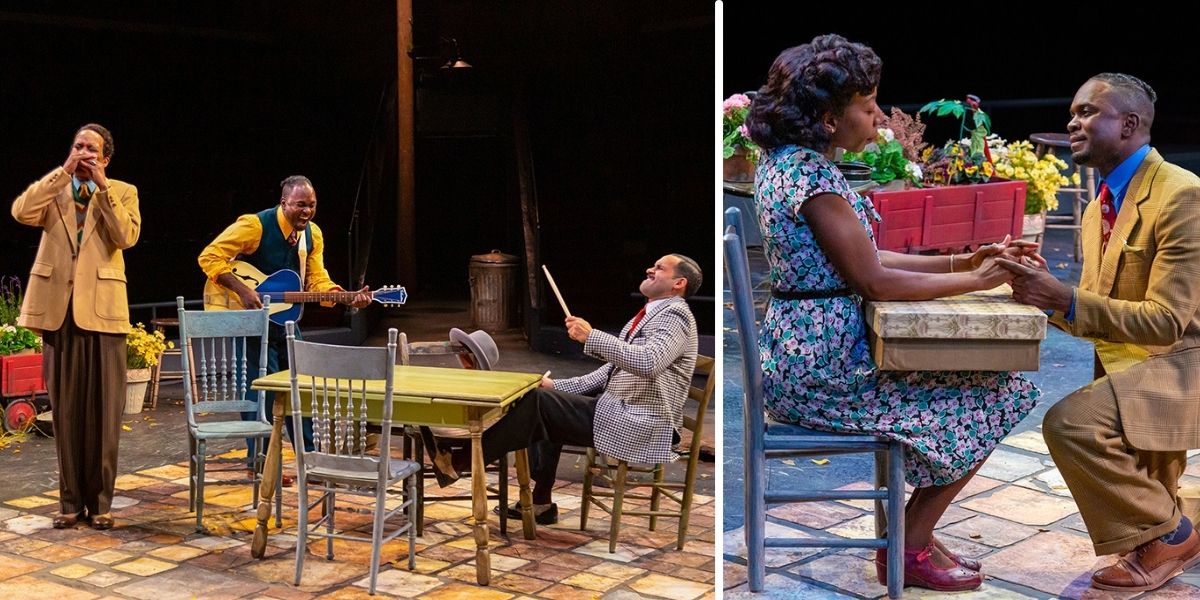“My kind of blues begins with catastrophe. It begins with the pile-age of wreckage. One piled on another. That’s the starting point. The blues is personal catastrophe lyrically expressed… How do you generate an elegance of earned self togetherness so that you have a stick-to-it-ness in the face of the catastrophic and the calamitous and the horrendous and the scandalous and the monstrous.” — Cornel West
The above quotation sums up the plot, the feeling, and the action of August Wilson’s Seven Guitars. Under the direction of Tazewell Thompson, the production of this play now at Arena Stage has a running time of almost three hours. And it’s worth every minute.

(Left:) Eden Marryshow, Michael Anthony Williams, Roz White, and Joy Jones; Joy Jones and Eden Marryshow in ‘Seven Guitars.’ Photo by Ryan Maxwell Photography.
Some have hypothesized that Wilson’s plays tend to be long because instead of telling us the streamlined story of an individual in isolation, Wilson dramatizes the symbiotic relationship between the individual and the society of which the individual is inescapably an expression and manifestation. Seven Guitars serves as a convincing demonstration of that hypothesis.
Seven Guitars begins with a gathering of friends after the funeral of Floyd Barton (Roderick Lawrence). The events that lead up to Floyd’s death are then told in flashback. Floyd returns to Pittsburgh intending to rekindle his relationship with his former girlfriend, Vera (Joy Jones), and return with her and his musician buddies Canewell (Michael Anthony Williams) and Red Carter (Eden Marryshow) to Chicago, where he has a tentative contract to make some recordings for Savoy Records. Vera lives in a complex with the sisterly, if somewhat bossy, Louise (Roz White) and across the yard from the older and somewhat traumatized Hedley (David Emerson Toney). Louise is visited by her young niece Ruby (Dane Figueroa Edidi), who is pregnant and trying to escape the attentions of jealous men. Floyd encounters obstacle after obstacle in his efforts to return to Chicago. In desperation to gain the money he needs, he makes a choice that, through a series of connected events, leads to his death.
While musicians and musical instruments feature prominently in this play (Floyd and his backup guys Canewell and Red Carter sing and play several times; Louise opens the play with the sexy “If you want to try my cabbage”; Floyd’s hit recording is played), it is their spoken language and the way they use it that becomes the show’s transcendent music, and a demonstration of that symbiotic relationship between the individual and the community.
Director Thompson has created an atmosphere that encourages his actors to literally physically embody the musicality that is in the language. That embodiment demonstrates this cooperative and collective relationship between Floyd, the putative protagonist of the play, and all of the rest of the characters in this community. That embodiment by the actors is contagious, and under its influence, this show soars. The actors don’t just speak their dialog, they almost dance it. The actors use their bodies to contain, illustrate, contextualize, or emphasize the verbal message. It’s invigorating and reminded me of some of the jazz and blues groups and their dizzying exchanges of solos. Each of the actors in this production makes pointed use of their featured solo monologue amid the ensembles. But on opening night, during Roz White’s monologue, the audience was unable to contain itself and broke into spontaneous applause before she could finish speaking. The joint was jumpin’, as they say.

Each of the women had their distinctive and individual expressions of sensuality. Joy Jones as Vera carried an accessible, unpretentious, and contained sexiness that exactly embodied the Canewell’s description: “you know how to make your bed up high and turn your lamp down low.” Dane Figueroa Edidi as Ruby was a delightful and continually surprising exercise in extended brazenness. Roz White’s Louise had the text by the throat and wrapped around her finger. And from the way that she carried herself in that glittery dress, you could see where Ruby got her style sense from. Each of the men gave us portraits of wounded warriors. David Emerson Toney’s Hedley was by turns scary and empathy-inducing. Michael Anthony Williams gave us a Canewell who was honest, hard-headed, and with a fragile ego. Eden Marryshow’s Red Carter was lovable fool and opportunist. Frederick Lawrence’s Floyd embodied determined desperation.
The set by Daniel Eastman makes efficient use of the cavernous in-the-round space of the Fichandler, making it seem homey. The set felt lived in. The costumes (Harry Nadal) were sensual and eloquent. When everyone got dressed up to go to the nightclub to hear the men play, the sense of occasion-appropriate sexiness was delightful, with each costume amping up the titillation until Ruby’s scene-stealing entry in a hussy-red gown.

Every man in this play has had multiple dreams crushed by the effects of the ongoing implementation of systemic racism and white supremacy against them. Every woman has experienced the fallout from that deprivation in the relations they have been able to have with the men in their lives. Every single one of these people has resisted targeting by white supremacy with continuous resourcefulness. Seven Guitars is a kind of blues that is ultimately singing to us about the African American genius for finding a way to make a way out of no way. I didn’t leave this show depressed. I left this show exhilarated.
Running Time: Approximately 2 hours and 55 minutes with a 15-minute intermission
Seven Guitars plays through December 26, 2021, in the Fichandler Stage at Arena Stage, 1101 Sixth Street SW, Washington, DC. Tickets ($105) may be purchased online, by phone at 202-488-3300, or at the Arena Stage sales office Tuesday through Saturday from noon until 8 p.m. for phone purchases and beginning 90 minutes prior to each performance until curtain for in-person purchases. For information on savings programs such as pay-your-age tickets, student discounts, Southwest Nights, and hero’s discounts, visit arenastage.org/tickets/savings-programs.
UPDATE: Arena Stage announced December 23, 2021, that “due to a COVID-19 exposure,” the remaining performances of August Wilson’s Seven Guitars — originally scheduled to run through December 26 — are canceled. Patrons who hold tickets to the remaining performances will be contacted as soon as possible and provided further options. “We are extremely disappointed that this powerful and critically acclaimed production is coming to an abrupt end. However, the care and safety of Arena Stage’s patrons, artists, and staff is and continues to be our top priority.”
The digital program can be viewed here.
COVID Safety: Proof of vaccination against COVID-19 and photo identification must be shown to enter the building. Arena’s complete safety protocols are here.
SEE ALSO:
‘I have to live in hope’: Tazewell Thompson gets personal (interview by Ramona Harper)
Arena Stage to roar back with mix of bubbly and soul (season announcement)
CAST
Louise: Roz White
Red Carter (Nov. 26 – Dec. 23): Eden Marryshow
Red Carter (Dec. 24 – Dec. 26): Kevin E. Thorne II
Canewell: Michael Anthony Williams
Vera: Joy Jones
Hedley: David Emerson Toney
Floyd Barton: Roderick Lawrence
Announcer: Edmund Bradley
Ruby: Dane Figueroa Edidi
Vera/Ruby/Louis understudy: Renee Elizabeth Wilson
Floyd/Red Carter/Hedley/Canewell Understudy: Kevin E. Thorne II
PRODUCTION
Director: Tazewell Thompson
Set Designer: Donald Eastman
Costume Designer.: Harry Nadal
Lighting Designer.: Robert Wierzel
Sound Designer: Fabian Obispo
Wig Designer: Anne Nesmith
Fight Director: Ron Piretti
Stage Manager: Marne Anderson
Assistant Stage Manager: Emily Ann Mellon




